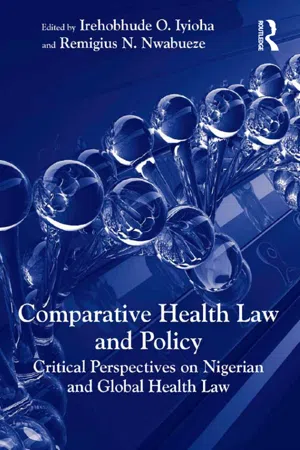
Comparative Health Law and Policy
Critical Perspectives on Nigerian and Global Health Law
- 348 pages
- English
- ePUB (mobile friendly)
- Available on iOS & Android
Comparative Health Law and Policy
Critical Perspectives on Nigerian and Global Health Law
About This Book
Health law and policy in Nigeria is an evolving and complex field of law, spanning a broad legal landscape and drawn from various sources. In addressing and interacting with these sources the volume advances research on health care law and policy in Nigeria and spells the beginning of what may now be formally termed the 'Nigerian health law and policy' legal field. The collection provides a comparative analysis of relevant health policies and laws, such as reproductive and sexual health policy, organ donation and transplantation, abortion and assisted conception, with those in the United Kingdom, United States, Canada and South Africa. It critically examines the duties and rights of physicians, patients, health institutions and organizations, and government parastatals against the backdrop of increased awareness of rights among patient populations. The subjects, which are discussed from a legal, ethical and policy-reform perspective, critique current legislation and policies and make suggestions for reform. The volume presents a cohesive, comparative, and comprehensive analysis of the state of health law and policy in Nigeria with those in the US, Canada, South Africa, and the UK. As such, it provides a valuable comparison between Western and Non-Western countries.
Frequently asked questions
Chapter 1 Pathologies, Transplants and Indigenous Norms: An Introduction to Nigerian Health Law and Policy
Introduction
Systemic Pathologies, Legal Transplants and Local Norms
Table of contents
- Cover Page
- Half Title Page
- Title Page
- Copyright Page
- Table of Contents
- Notes on Contributors
- Acknowledgements
- 1 Pathologies, Transplants and Indigenous Norms: An Introduction to Nigerian Health Law and Policy
- 2 Healthcare Organization and Financing
- 3 Regulation of Healthcare Practice
- 4 Medical Negligence
- 5 Informed Consent
- 6 Physicians’ Handling of Patients’ Health Information: Ethics and Law of Confidentiality
- 7 Children and Adolescents’ Access to Reproductive and Sexual Healthcare
- 8 Euthanasia, Assisted Suicide and Decision-making at the End of Life
- 9 Abortion and the Law
- 10 Organ Donation and Transplantation
- 11 Assisted Reproductive Technology
- 12 Medical Integration: Law and Policy on Alternative and Integrated Medical Practice
- 13 Governance of Research Involving Human Subjects
- Index